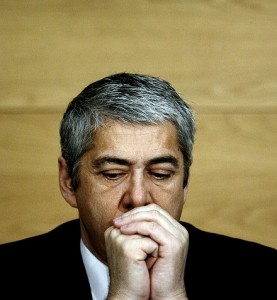Borrowing costs on Portugal’s debt have hit a level that proved unsustainable for both Greece and Ireland, but Lisbon is refusing to countenance talk of an EU bailout. Can this small, recession-prone nation hold out much longer?
Long lumped along with Ireland, Greece and Spain as one of the so-called PIGS, Portugal has so far managed to face down fears about its ability to service its debt better than many policymakers, economists and investors could have expected. Even as the yield on 10-year Portuguese bonds soared to 7.63 percent in mid-February –the highest level since the country became a founder member of the single currency at the end of the 1990s– and the European Central Bank stepped in to buy up bonds no one else would touch, the Lisbon government continued to hold its ground.

“There are no reasons to think Portugal does not have conditions to keep tapping the markets. It’s quite the opposite,” Portuguese Cabinet Minister Pedro Silva Pereira assured. And he was quick to single out the usual culprits –speculators and attacks on the euro currency– for blame: “This has to do with sovereign debt markets and not only in relation to Portugal but rates at the European level – all subject to speculative moves attacking the euro.”
Germany, France and other euro zone countries have been urging Portugal to seriously consider taking a bailout in order to avoid instability that could hurt the wider region and further undermine the euro.
But a combination of Portuguese pride and the risk that a bailout could bring down the minority Socialist government of Prime Minister José Sócrates have made policymakers especially reluctant to consider outside help. In addition, an Irish or Greek-style bailout involving not only the EU but also the International Monetary Fund would be particularly humiliating, exhuming the ghosts of the IMF-ordered austerity Portugal experienced in the 1980s. The prejudice against a bailout, which would come with fiscal and policy strings attached, is juxtaposed with Portugal’s own home-grown austerity measures.
These aim to reel in the budget deficit, pay down debt and stabilise an economy that has repeatedly dipped in and out of recession even before the global financial crisis struck. There are signs the situation could be heading downhill again after recently released figures showed the economy shrank by 0.3 percent in the last quarter of 2010. That, in turn, cast doubts on whether Lisbon would be able to achieve its promised deficit reductions in 2011.
Nonetheless, Portuguese officials are adamant that the country is getting to grips with its financial problems. Silva Pereira stressed recently, for example, that there are “extremely positive” signs from tax revenues and that the government is still committed to slashing the budget deficit this year to 4.6 percent of GDP from around 7 percent last year.
With Lisbon’s austerity measures fuelling social and political fires –from strikes and an increase in gold sales by cash-strapped Portuguese to a no-confidence motion in parliament against the government– accepting a foreign bailout that would likely force further austerity on the country could be political suicide for Sócrates.
Anything but a bailout
Instead, analysts are speculating that Lisbon is trying to hold out for an alternative solution from the European Union, possibly in the form of a flexible credit line with conditions that would fall short of the sort of full-scale bailout that would imply intervention by the EU, IMF and the European Central Bank.
Such a step would save face for the Portuguese government, which has repeatedly called for a “European” solution and has insisted that it is already doing its part by reducing its budget deficit as agreed with Brussels.
A way out of Portugal’s current predicament could emerge when European Union leaders hold a summit on March 24-25 to finalise a “comprehensive package” of policies to tackle the euro zone’s debt crisis. Among other things, they are expected to raise the effective lending capacity of the European Financial Stability Facility, the €440-billion bailout fund agreed last May, and give it more flexibility on how to use its money – allowing it, for example, to buy the bonds of indebted countries from the primary or secondary markets, or fund countries’ buybacks of their own bonds.
Asked to comment on Portugal’s situation last week, European Central Bank President Jean-Claude Trichet was unambiguous: “We call… on all governments… first to apply the plan that they have. They all have a plan; they have a commitment. They all have to apply their plan, their commitments –it’s true for Portugal as well- as rigorously … as possible. This is a very strong message for Portugal and others.” He added: “It’s up to the countries themselves to be up to the task of proving to markets that they are credible.”
Indeed, ultimately it will be the markets that decide whether Portugal must swallow its pride and accept a bailout.
Leave a Reply
You must be logged in to post a comment.